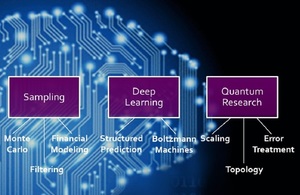Dstl forecasts future quantum landscape for UK defence and security
Embracing quantum technology now could lead to the enhanced pace, precision and pre-emption of decision making by military commanders

A range of quantum computing applications (Picture credit: D-Wave)
The UK’s emerging Artificial Intelligence (AI) capabilities could achieve a decisive step-change by adopting current and near-term quantum technologies.
According to a research paper published by the Defence Science and Technology Laboratory (Dstl), on behalf of the Ministry of Defence (MOD) and in collaboration with UK Strategic Command “Quantum Information Processing Landscape 2020: Prospects for UK Defence and Security,” embracing quantum technology now could lead to the enhanced pace, precision and pre-emption of decision making by military commanders.
Dstl’s report identified commercially available quantum computers – ‘annealers’ – as having the potential to run an important and versatile class of AI software at speeds vastly in excess of normal digital computers. This software is based on an algorithm called a ‘neural net’; a mature and proven method of pattern-matching, which imposes extremely high loads on a classical digital computer architecture. However, the unique properties of a quantum annealer means that it can execute a neural net in one machine cycle instead of thousands or millions.
The report describes how, in the short-term, quantum neural nets could be used to perform Quantum Information Processing (QIP) to search archive, near real and real-time data feeds, automatically looking for features of interest, detecting anomalies and instances of change. This would significantly improve the time, cost and quantity of military data processing, while simultaneously releasing intellectual capacity among operators.
Over the subsequent 5 to 10 years, within MOD and more widely, QIP technologies could also be applied to:
- Financial trading;
- Control systems in aircraft, missiles, fire control and defensive systems;
- Sensor data processing such as data fusion, navigation, resolving signals in noise, interference and jamming;
- Machine Learning;
- Artificial Intelligence situational understanding;
- Warning marker identification;
- Pattern analysis undiscernible to the human eye.
Dstl’s report is being released for input and comment from the defence community including industry and academia. After review, key findings and recommendations will be added and the document will be finalised to create an authoritative evidence base to support future investment decisions. Subject to funding, a benchmark exercise could commence during 2020. If benchmarking confirms the review’s findings, an in service initial operating capability could be realised as soon as 2025. This would help build quantum expertise in MOD and ensure an organisation ‘quantum-ready’ for the future.
Although currently maintaining a watching brief on quantum computing, Dstl, supported by funding from MOD, also has a keen interest in quantum sensing technologies. This is realised through a close collaboration with the National Quantum Technologies Programme, a partnership supporting national expertise in this cutting edge technology.
Gary Aitkenhead, Dstl Chief Executive, commented: “Quantum technology is a game-changer for defence and society, and one that both maintains the security of the UK as well as offering clear economic benefits. The UK is a world leader in many aspects of QIP and this report outlines a clear path for future development.”
For further information on the report contact: quantum@dstl.gov.uk